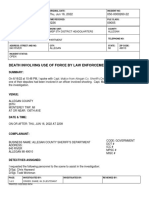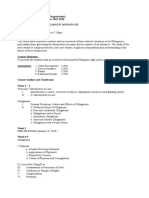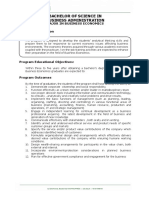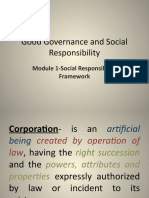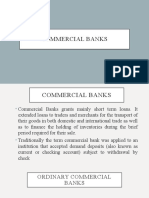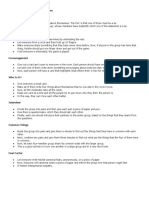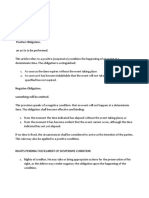BACC 222 Business Law
BACC 222 Business Law
Uploaded by
marinel juneCopyright:
Available Formats
BACC 222 Business Law
BACC 222 Business Law
Uploaded by
marinel juneOriginal Description:
Copyright
Available Formats
Share this document
Did you find this document useful?
Is this content inappropriate?
Copyright:
Available Formats
BACC 222 Business Law
BACC 222 Business Law
Uploaded by
marinel juneCopyright:
Available Formats
Course Code: BACC 222
Course Title: Business Law (Obligations and Contracts)
Course Description: This course provides an understanding of the legal concepts and rules
governing business transactions, namely: obligations, contracts and sales.
Course Outcomes: After completing this course, the students will be:
a. Oriented with the basic precepts of the Philippine Legal System;
b. Knowledgeable about provisions in the Civil Code of the Philippines governing business
transactions;
c. Able to analyze case problems in the Supreme Court Rulings; and
d. Able to appreciate business laws and apply knowledge gained to relevant situations.
Duration/Credits: 3 units
Course Outline:
A. Obligations
1. General legal concepts of enforceable rights and obligation
1.1 Types of laws
1.1.1 Constitutional laws
1.1.2 Administrative laws
1.1.3 Criminal laws
1.1.4 Civil laws
1.1.5 Fiscal laws
1.1.6 Mercantile (commercial laws) including laws of credit
1.1.7 Insolvency and bankruptcy laws (Financial rehabilitation and Insolvency Act of
2010).
1.2 Sources of obligations and their concepts
1.2.1 Law
1.2.2 Contracts
1.2.3 Quasi Contracts
1.2.4 Delicts
1.2.5 Quasi-delicts
1.3 National legal system
1.3.1 The system of courts and the administration of justice.
1.3.2 Case laws and/or legislation and regulations affecting enterprises
1.3.3 Precedents and statutory interpretations (disputes and the use of experts)
1.4 The nature, purpose, scope and key principles of national legislation, directives and case
2. Nature and effect of obligations
2.1 Specific circumstances affecting obligations in general
2.2 Fortuitous events
2.3 Fraud
2.4 Negligence
2.5 Delay
2.6 Breach of contract
3. Different kinds of obligations under the Civil Code
3.1 Pure and conditional obligations
3.2 Obligations with a period
3.3 Alternative and facultative obligations
3.4 Joint and solidary obligations
3.5 Divisible and indivisible obligations
3.6 Obligations with a penal clause
3.7 Extinguishment of obligation
4.1 Payment or performance
4.1.1 Payment of debts of money
4.1.2 Mercantile documents as means of payments
4.1.3 Special forms or mode of payment
4.2 Loss of thing due
4.3 Remission or condonation
4.4 Confusion or merger of rights
4.5 Compensation
4.6 Novation
B. Contracts
1. Concepts and classification
2. Elements and stages
3. General principles of the law of contracts
3.1 Formation of a contract
3.2 Contract contents and terms including exclusion clauses
3.3 Discharge of a contract
3.4 Remedies for failure to perform contract terms
4. Freedom from contract and limitation
5. Persons bound
6. Consent
6.1 Capacitated persons
6.2 Requisites
6.3 Vices of consent
7. Objects of contracts
8. Considerations of contracts
9. Formalities of contracts
10. Interpretation and reformation of contract
11. Defective contracts
11.1 Rescissible
11.2 Voidable
11.3 Unenforceable
11.4 Void
C. Contract of Sales
1. Nature, characteristics and kinds of sale
2. Elements, forms, requisites and perfection of a contract of sale.
3. Implied and specified terms
4. Distinguished from
4.1 Dacion en pago
4.2 Cession in payment
4.3 Contract for a piece of work
4.4 Barter
5. Earnest money as distinguished from option money
6. Rights and obligations of a seller
7. Rights and obligations of a buyer
8. Remedies of unpaid seller
9. Warranties (in relation to consumer laws)
10. Sales with a right to repurchase of conventional redemption, legal redemption.
11. Sales on credit
12. Installment sales
12.1 Personal property – Recto law
12.2 Real Property – Maceda Law
12.3 PD 957/Condominium Act
13. Transfer of the possession of property
14. Performance
15. Remedies
You might also like
- MSP Nagle ReportDocument51 pagesMSP Nagle ReportWXMI100% (2)
- LawBriefs TortsDocument299 pagesLawBriefs TortsYunzhu Li100% (1)
- Obligations and Contracts LectureDocument28 pagesObligations and Contracts LectureMila Casandra CastañedaNo ratings yet
- Oig Annual Report 2023Document248 pagesOig Annual Report 2023Todd FeurerNo ratings yet
- SYLLABUS Business Orgsanization Law ABM BDocument2 pagesSYLLABUS Business Orgsanization Law ABM BMarceliano Monato IIINo ratings yet
- Office System Mamanagement: in Tne GovernmentDocument45 pagesOffice System Mamanagement: in Tne GovernmentVincent BernardoNo ratings yet
- Duties of Debtor Right of CreditorDocument7 pagesDuties of Debtor Right of CreditorLimVianesseNo ratings yet
- Financial Controllership: Michael Angelo S. de LeonDocument27 pagesFinancial Controllership: Michael Angelo S. de LeonBoboy AzanilNo ratings yet
- Capital Markets Chapter 3Document11 pagesCapital Markets Chapter 3Faith FajarilloNo ratings yet
- Five Persistent Behavior Problems and How To Handle ThemDocument6 pagesFive Persistent Behavior Problems and How To Handle Themmarinel june100% (1)
- What Is A PsychopathDocument30 pagesWhat Is A Psychopathmarinel june100% (1)
- Banking and Financial InstitutionsDocument6 pagesBanking and Financial InstitutionsSheena Dela Cruz100% (1)
- Module 1 Banking-Financial-InstitutionDocument6 pagesModule 1 Banking-Financial-InstitutionShean BucayNo ratings yet
- Lecture 1 - Obligation and ContractsDocument2 pagesLecture 1 - Obligation and ContractsChriselda CabangonNo ratings yet
- Chapter 9 Classes and Kinds of CreditDocument15 pagesChapter 9 Classes and Kinds of CreditJonavel Torres MacionNo ratings yet
- Obligation - Reviewer1Document58 pagesObligation - Reviewer1Mary Ann PastoresNo ratings yet
- RA No. 8556Document20 pagesRA No. 8556TianetteNo ratings yet
- Global INternational TradeDocument5 pagesGlobal INternational TradeLorraine CastilloNo ratings yet
- Role of The BSPDocument25 pagesRole of The BSPFe ValenciaNo ratings yet
- Basic Finance Chapter 1Document38 pagesBasic Finance Chapter 1jayrenNo ratings yet
- Credit Appraisal Means An InvestigationDocument3 pagesCredit Appraisal Means An InvestigationSoumava Paul100% (1)
- The Deposit FunctionDocument17 pagesThe Deposit FunctionNigel N. SilvestreNo ratings yet
- Compilation of Topics Discussed in Marketing 21Document21 pagesCompilation of Topics Discussed in Marketing 21Brian Reyes GangcaNo ratings yet
- Banking and Financial InstitutionDocument5 pagesBanking and Financial InstitutionMariel Crista Celda Maravillosa100% (1)
- Law NotesDocument14 pagesLaw NotesZaimaery LambitNo ratings yet
- Chattel MortgageDocument9 pagesChattel MortgageLess Balesoro100% (1)
- Labor Relations and NegotiationsDocument4 pagesLabor Relations and NegotiationsCza PeñaNo ratings yet
- Bangko Sentral NG PilipinasDocument59 pagesBangko Sentral NG PilipinasAnn balledosNo ratings yet
- Personal Balance Sheet 03Document5 pagesPersonal Balance Sheet 03Hanna mariel Del MundoNo ratings yet
- Learning Module #3 Investment and Portfolio Management: Participating, and Cumulative and ParticipatingDocument6 pagesLearning Module #3 Investment and Portfolio Management: Participating, and Cumulative and ParticipatingAira AbigailNo ratings yet
- The Impact of Investment From Multiple PerspectiveDocument2 pagesThe Impact of Investment From Multiple PerspectiveSubido, John ChristianNo ratings yet
- Chapter 3 Bank ManagementDocument6 pagesChapter 3 Bank ManagementMariel Crista Celda MaravillosaNo ratings yet
- Lesson 3 Part 1 Internal and External InstitutionsDocument22 pagesLesson 3 Part 1 Internal and External InstitutionsDeanne GuintoNo ratings yet
- Articles of CooperationDocument9 pagesArticles of CooperationKimberly GallaronNo ratings yet
- Chapter 1Document4 pagesChapter 1Lyn AmbrayNo ratings yet
- Introduction of Business LawDocument18 pagesIntroduction of Business Laweshu agNo ratings yet
- BSPDocument11 pagesBSPMeloy ApiladoNo ratings yet
- Special Topics in Financial ManagementDocument4 pagesSpecial Topics in Financial ManagementLaura AquinoNo ratings yet
- Online Lecture On LAW ON CORPORATION (TITLE IV - Sections 35 - 44, POWERS OF CORPORATION)Document32 pagesOnline Lecture On LAW ON CORPORATION (TITLE IV - Sections 35 - 44, POWERS OF CORPORATION)Nicole Daphne FigueroaNo ratings yet
- Documents in Credit TransactionsDocument6 pagesDocuments in Credit Transactionsgeofrey gepitulanNo ratings yet
- General Divisions of LawDocument2 pagesGeneral Divisions of LawKurtLimNo ratings yet
- Monetary Policy and Central Banking in The PhilippinesDocument29 pagesMonetary Policy and Central Banking in The PhilippinesYogun BayonaNo ratings yet
- Types of Business: Sole ProprietorshipDocument4 pagesTypes of Business: Sole ProprietorshipedrianclydeNo ratings yet
- Batas Pambansa Blg.22Document10 pagesBatas Pambansa Blg.22Mavz PelonesNo ratings yet
- BSP Org PrimerDocument34 pagesBSP Org PrimerJuan PerezNo ratings yet
- Banking Financial Institutions - SyllabusDocument8 pagesBanking Financial Institutions - SyllabusLove RosalunaNo ratings yet
- 8.BSBA Business EconomicsDocument12 pages8.BSBA Business EconomicsLorilieNo ratings yet
- Business Ethics and Ethical Decision Making: Learning ObjectivesDocument8 pagesBusiness Ethics and Ethical Decision Making: Learning ObjectivesSteffanie OlivarNo ratings yet
- Chapter 3 SOURCES OF CREDITDocument20 pagesChapter 3 SOURCES OF CREDITmarcus vladNo ratings yet
- Good Governance and Social Responsibility Lesson 1Document34 pagesGood Governance and Social Responsibility Lesson 1Gelo Jacobe DelValleNo ratings yet
- Topic 4 Functions Operations of Central BankDocument36 pagesTopic 4 Functions Operations of Central BankChristian Gene MonterolaNo ratings yet
- Business Law 2Document6 pagesBusiness Law 2JavidNo ratings yet
- The BSP Seal LatestDocument5 pagesThe BSP Seal LatestJess Francis LicayanNo ratings yet
- Week 5 CCP Target Market ID & PrescreeningDocument26 pagesWeek 5 CCP Target Market ID & PrescreeningAkii WingNo ratings yet
- Siena College of Taytay Inc. Taxation 1 - Income Taxation College of Business and AccountancyDocument2 pagesSiena College of Taytay Inc. Taxation 1 - Income Taxation College of Business and AccountancyDonnan OreaNo ratings yet
- Lesson 3 - Credit ProcessDocument6 pagesLesson 3 - Credit ProcessRachel Ann RazonableNo ratings yet
- Commercial BankDocument25 pagesCommercial Bankcj.terragoNo ratings yet
- ARTICLE 1388: Liability of AcquirerDocument19 pagesARTICLE 1388: Liability of AcquirerClarence ProtacioNo ratings yet
- Banking and Financial Institutions Chapter 3Document32 pagesBanking and Financial Institutions Chapter 3Lorena100% (1)
- Chapter 12 - International FranchisingDocument17 pagesChapter 12 - International FranchisingHoon Yi YangNo ratings yet
- Chapter 4 Commercial BanksDocument33 pagesChapter 4 Commercial BanksChichay KarenJoyNo ratings yet
- Midterm Examination in Capital MarketsDocument3 pagesMidterm Examination in Capital MarketsNekki Joy LangcuyanNo ratings yet
- Topics in CBMECDocument113 pagesTopics in CBMECARLENE GARCIANo ratings yet
- Civil Law Rev 2 SyllabusDocument5 pagesCivil Law Rev 2 SyllabusFernand CJ CastroNo ratings yet
- Course Description and Syllabus - Law For Economists - Phan Nhat Thanh 2020 (Updated)Document14 pagesCourse Description and Syllabus - Law For Economists - Phan Nhat Thanh 2020 (Updated)Tuan Anh HoangNo ratings yet
- Compassionate Self-AccountabilityDocument3 pagesCompassionate Self-Accountabilitymarinel juneNo ratings yet
- JTAN Reality Therapy HandoutsDocument4 pagesJTAN Reality Therapy Handoutsmarinel juneNo ratings yet
- Family Systems Therapy HandoutDocument5 pagesFamily Systems Therapy Handoutmarinel juneNo ratings yet
- Fun Get To Know Each Other GamesDocument1 pageFun Get To Know Each Other Gamesmarinel juneNo ratings yet
- Balasico, Sarah S. FM21 SECTION 1. - Pure and Conditional ObligationsDocument4 pagesBalasico, Sarah S. FM21 SECTION 1. - Pure and Conditional Obligationsmarinel juneNo ratings yet
- BL 121Document7 pagesBL 121marinel juneNo ratings yet
- Team Building ActivitiesDocument5 pagesTeam Building Activitiesmarinel juneNo ratings yet
- ObliconDocument2 pagesObliconmarinel juneNo ratings yet
- .-Joint and Solidary ObligationDocument4 pages.-Joint and Solidary Obligationmarinel juneNo ratings yet
- Name: Diana Marie P. Datu Topic: Indivisible Obligation: FulfillmentDocument3 pagesName: Diana Marie P. Datu Topic: Indivisible Obligation: Fulfillmentmarinel juneNo ratings yet
- For Handout B.F. SkinnerDocument6 pagesFor Handout B.F. Skinnermarinel juneNo ratings yet
- Banate Gysel C. (B. Obligations With A Period)Document4 pagesBanate Gysel C. (B. Obligations With A Period)marinel juneNo ratings yet
- Balona Dorothy Positive Obligation Under Different Kinds of Obligation Under Civil LawDocument2 pagesBalona Dorothy Positive Obligation Under Different Kinds of Obligation Under Civil Lawmarinel juneNo ratings yet
- International Convention For The Protection of All PersonsDocument18 pagesInternational Convention For The Protection of All PersonsSon Gabriel UyNo ratings yet
- Guy v. CA 502 SCRA 151 (2006)Document5 pagesGuy v. CA 502 SCRA 151 (2006)Rosel RamsNo ratings yet
- CMC NO. 11-13 Dated May 23. 2013Document5 pagesCMC NO. 11-13 Dated May 23. 2013RLDDD PRO10No ratings yet
- The Road To The ProfessionalizationDocument42 pagesThe Road To The ProfessionalizationhannaleigmactalNo ratings yet
- China Bank V Ortega (Full)Document4 pagesChina Bank V Ortega (Full)Christiane Marie BajadaNo ratings yet
- People v. BoutinDocument3 pagesPeople v. BoutinRANo ratings yet
- 5dept. of Justice Vs Liwag DIGESTDocument2 pages5dept. of Justice Vs Liwag DIGESTMaricel Pereña Diesta PajanustanNo ratings yet
- Special Power Act 1974Document25 pagesSpecial Power Act 1974Razon GhoshNo ratings yet
- Rules of Professional Conduct Cross-Reference ChartDocument7 pagesRules of Professional Conduct Cross-Reference ChartH.I.M Dr. Lawiy ZodokNo ratings yet
- A Comparartive Analysis of Laws Relating To Obscenity Problems & ProspectsDocument77 pagesA Comparartive Analysis of Laws Relating To Obscenity Problems & ProspectsSoumya PahujaNo ratings yet
- CRPC RD ProjectDocument4 pagesCRPC RD ProjectAsthaNo ratings yet
- Tubigon 1Document5 pagesTubigon 1Colleen Rose GuanteroNo ratings yet
- B.M. No. 850Document6 pagesB.M. No. 850Chiic-chiic Salamida100% (1)
- Ational Aw Institute Niversity: Concept and Development of Humanitarian LawDocument30 pagesAtional Aw Institute Niversity: Concept and Development of Humanitarian LawVicky DNo ratings yet
- Malvar Vs Atty. BalerosDocument15 pagesMalvar Vs Atty. BalerosAJ SantosNo ratings yet
- Part 1 Disqualification of WitnessDocument3 pagesPart 1 Disqualification of WitnessNin JaNo ratings yet
- Fronda Baggao V PeopleDocument1 pageFronda Baggao V PeopleQueenie Joy AccadNo ratings yet
- Akshat Jaiswal CRPC AssignmentDocument3 pagesAkshat Jaiswal CRPC Assignmentchhaayaachitran akshuNo ratings yet
- Fixed Term Contract: Is Made On 18Document11 pagesFixed Term Contract: Is Made On 18Jitesh SapariyaNo ratings yet
- Labour LawDocument94 pagesLabour LawARYAN RAKESHNo ratings yet
- Prevention of Cyber Crime in BangladeshDocument46 pagesPrevention of Cyber Crime in BangladeshDavid OjoNo ratings yet
- LB-6034 Content Minor Acts and Supreme Court RulesDocument8 pagesLB-6034 Content Minor Acts and Supreme Court RulesAdityaNo ratings yet
- A.M. No. 997Document6 pagesA.M. No. 997David Jayson Barcelona OquendoNo ratings yet
- Cases and MaterialDocument52 pagesCases and Material17011 AKANKSHA MATHURNo ratings yet
- Lea Mer Industries v. Malayan InsuranceDocument2 pagesLea Mer Industries v. Malayan InsuranceGertrude Arquillo100% (1)
- Slavery in AmericaDocument3 pagesSlavery in AmericacharlesNo ratings yet
- Criteria Under Section 228 1 (B) of CRPCDocument11 pagesCriteria Under Section 228 1 (B) of CRPCIntern VSPNo ratings yet
